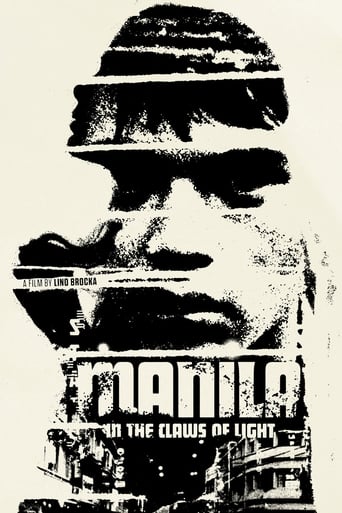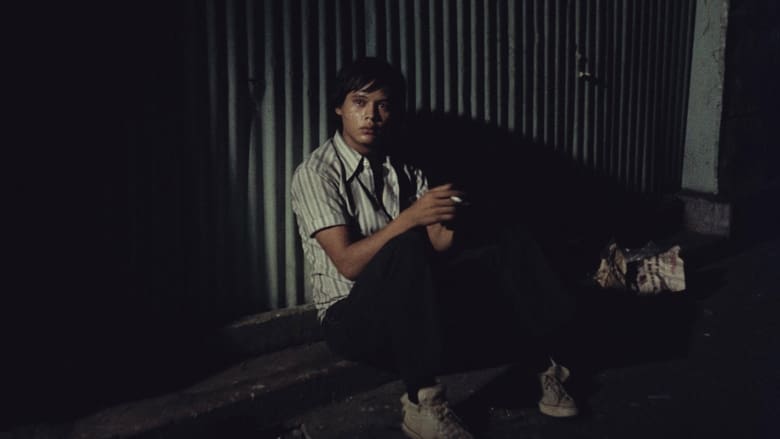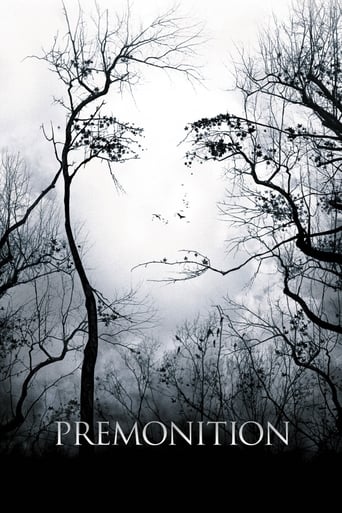

Manila in the Claws of Light (1975)
Julio, a young fisherman from a provincial village, descends into social alienation as he arrives in Manila to search for his loved one.
Watch Trailer
Cast
Similar titles


Reviews
Wow! Such a good movie.
Unshakable, witty and deeply felt, the film will be paying emotional dividends for a long, long time.
The movie really just wants to entertain people.
.Like the great film, it's made with a great deal of visible affection both in front of and behind the camera.
As always with a film like Manila in thr Claws of Light, context counts above all. This is a story that has a setting in the Phillipenes of poverty and a crushing sense of 'got to get by on the skin of my teeth', not to mention the exploitation of... Everyone, whether it be through work by day, by night, human and sex trafficking, the works (only drugs seem to be absent here, but im sure where were on the margins if not out in the open). The sense of repression in this society makes Italian neo-realist cinema seen quaint, and that is a strength of Brocka's film because he is putting up a lens through how he sees it: this is horrible, this is punishing, and the only thing that can be a light is if people care about one another. Though the thrust of the story is if Julio will find his beloved Ligaya in Manila, we dont get to that resolution until two thirds of the way into the film. Primarily this is about how someone who is an outsider to the city as Julio is from a seaside village (though still very much of the culture and time and place), and so we are also those outsiders. This is not meant to be a subtle trip - the horrible boss of the construction workers, being paid 2.50 a day but on paper it's 4, often is munching on a cigar and has the boss ethic of any given sweatshop in history - but thats not really a detriment. We believe this setting because we believe the people. I assume most of these players are not professionals, and they do well under Brocak's direction and tight budget. So when Julio is out in the streets, or outside the building where hes mostly certain Ligaya is being stowed away, it doesn't feel like we are seeing something so set apart from a reality we can see. On the contrary, this is poverty and thr decimation of working class people everywhere. Though criticism of the Marcos regime is not explicitly stated, it doesnt have to be. It's implicit in how so many of the people Julio comes across are mistreated (and of course some corrupt cops here and there who make no bones about stealing money and walking away help along the struggles), and of course for the women exploitation in the world of prostitution is exploitation of workers (just happens to be sex). Julio is as close as we can get to a moral compass - while his coworkers go one by one with a Booker he refuses, despite the pressure from the pump, for example - and his visions of the past are what he clings to. He doesnt see any life for himself without her, which makes for a good goal for the story, but is also his weakness - he loves this woman so much that nothing else can change for himself. If I had a nit to pick some of the flashbacks, while effective when done in sorr of subliminal ways, become frequent to the point of repetition because what else would there be to put in this cut or scene (or it may be the flashbacks themselves don't vary, it's just the same image of Ligaya in the beach). And yet my one criticism is addressed in a way by the time the movie gets to her and the two are reunited. So many scenes, in scene after scene, almost it feels like a pattern deliberately where the idea is, "THIS is what is happening to this overworked/underpaid/tragic person being exploited by the ruling classes," and while it could easily dip into propaganda I dont see this as some negative in that Brocka's passion and intensity as a filmmaker, the commitment to realism, takes away a feeling of "this is an *agenda* as it"s about these people who exist. But all these scenes are really leading up to Ligaya, who was exploitated just about the worst of all - in one long take that seems to last for about seven or eight minutes, she tells her story to Julio in a bedroom, and it's wise to not cut away. We are here listening to her story, and unlike at other points there is no cutting away; we have to picture this for ourselves.This is a sad and depressing story, but I didnt feel like it is a giant let down to watch because of the anthropological nature of how it's presented and how the melodrama escalates so believably. As Scorsese says in the intro on the criterion disc, this is a movie made for the people.
The linchpin of Filipino cinema, Lino Brocka's pièce de résistance has been received a well- deserved BluRay treatment, MANILA IN THE CLAWS OF LIGHT is a searing social critique told through the jeremiad of a young fishmonger from a provincial island, Julio Madiaga (the newcomer Roco purveys a deeply affecting performance as a new-in-town tenderfoot) arrives in the big city to search for his childhood sweetheart Ligaya (Koronel), who has been roped into shady prostitute ring from their hometown, only to be overcome by a society infested with moral turpitude and unspeakable vice, belonging to the lowest of the social rung, Julio is inexorably driven to a breaking point when he can only resort to the most radical method to express his fury and desperation, and his ultimate denouement is ominously preordained through the accretion of his violent impulse. Brocka hones a critical eye in presenting the film's urban jungle milieu, shot in actual loci: the harsh conditions of those construction workers, one of them, Atong (Salvador, Jr.) with whom Julio befriends, lives in the squalid shanty with his younger sister (Mendoza) and their bed-ridden father (a landowner expelled out of his own property by wealthy foreigners), adjacent to polluted water, believe it or not, he is in a well-off situation (before the sorry fate catches on with his family); a chock-a-block local market where bargains for goods soon sour into personal attacks and that particular building where Julio suspects Ligaya is interned by a Chinese Filipino Ah-Tek (Yap), the rare seen ringleader, and its neon-lit signboard. His pittance is shortchanged by the sleazy honcho and dangled by the intrusive oldest profession, sacked mercilessly when he is no longer needed, Julio witnesses accidental death befalls on the construction site, the indignant fate befalls on Atong and his family, still, he is too wet behind the ears, succumbs to the skulduggery of a policeman imposer on the street. The crescendo of injustice is which lends this film its cachet and its undimmed relevance, the whole drama probes an unyielding peer into the miasma of unrelieved depravity (just to plumb how pandemic this kind of pathology can reach with a deplorable cri-de-coeur), mirrored through Julio's nostalgic erstwhile memories (ultra-snappy edited), which we all but realize there is no way back. An unexpected sortie in the rough trade virtually becomes the most benevolent segment among a concatenation of threnodies, where Julio reluctantly dips his toes with an epicene punter, which imbues a purely libidinous concern without any creeping malevolence, that is prevalent elsewhere. But, not everyone can find his feet in that line of business, the bar is quite high, actually. An non- judgmental take on the often pejoratively depicted subculture does flag up Brocka's unflinching resolution to spark more social commentary than he would be allowed. Eventually, a chance meeting (a rather oddly conceived occasion wanting more context) reunites the star-crossed lovers, and Hilda Koronel recounts Ligaya's ordeal with palpable poignancy in the lengthy close-ups, only to be tritely weighed down by her inextricable maternal attachment, and spoils their final chance of a happier finale. Upholstered with a perturbing score from Jocson, MANILA IN THE CLAWS OF LIGHT is as harrowing a story as one could envision, but under Brocka's stylish execution, it brims with an urgency to provoke, to shock, to jolt viewers into condemnation, only if he could have curtailed his exasperating anti-China slant, viewed 40-odd years later.
Lino Brocka's 1975 film The Nail of Brightness (aka Manila in the Claws of Neon) is first and foremost a showcase for the social ills of the Philippines, particularly in the urban center of Manila. The film's main character Julio is only recently arrived to the city having left behind his impoverished but relatively dignified and happy life as a fisherman in a small village to find his girlfriend Ligaya who had herself gone to the city at the promise of a job and some educational opportunities only to disappear completely a short time later. Julio's episodic experiences in the city give Brocka a chance to exhibit all sorts of social issues as Julio is robbed of his savings before the film even begins and is forced to seek employment at an unsafe construction site where he agrees to work for a low wage and fails to even receive the meager pay he bargained for; the construction company can get away with this because of a lazy, inefficient government that apparently does nothing for its working class people. As the film continues Julio's misery grows greater; more than one character is forced to turn to prostitution to make ends meet and several major characters are the victims of violent crime.In spite of the didactic nature of the material, Brocka's film is a success because he builds sympathy for Julio through the use of subjective camera techniques. The narrative is peppered with brief, precisely edited flashback shots from Julio's point of view: the result is an unusually powerful evocation of memory. Brocka's subjective cinema transcends the established techniques of social realism and allows him create one of the greatest doomed characters in film history.
I'm not a fan of our local films here in the Philippines. I've seen so many cheesy Filipino films such as "Dyesebel", "Batang X" etc. But after I have seen "Maynila", everything changed.The film is simply amazing. It really blows me away. This is very original concept of story I have seen in my entire life. Although some moments are like "Midnight Cowboy" inspired, the whole story is very original.The characters are very memorable, though some acting needs some improvement. Thanks to the late Director, Lino Brocka for making this unforgettable, total human experience. Brocka is the greatest Filipino director, and I'm sure everyone will agree on me.10/10




